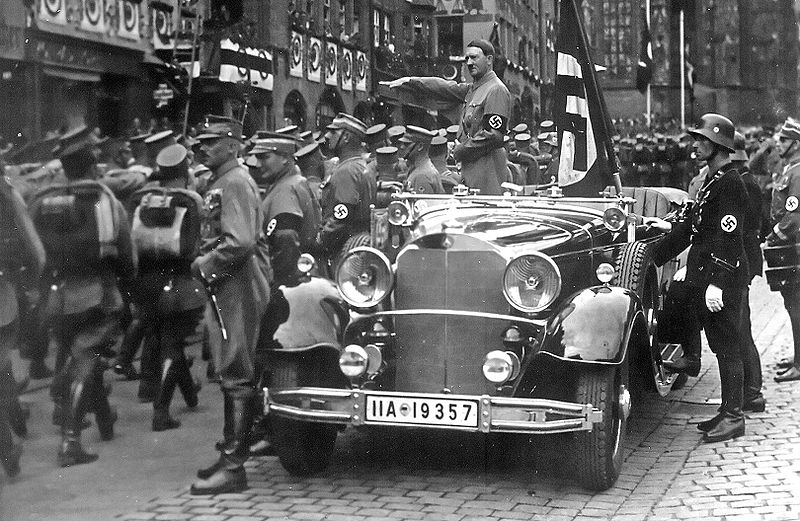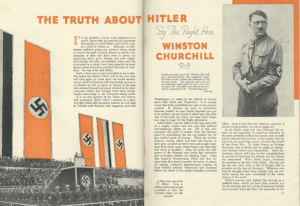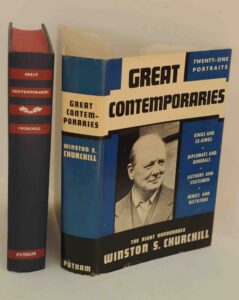
Churchill’s Hitler Essays: He Knew the Führer from the Start
Excerpted from “The Three Lives of Churchill’s Hitler Essays,” written for the Hillsdale College Churchill Project. For the original article with endnotes, click here. To subscribe to weekly articles from Hillsdale-Churchill, click here, scroll to bottom, and enter your email in the box “Stay in touch with us.” We never disclose or sell your email address. It remains a riddle wrapped in a mystery inside an enigma.
The Hitler Essays:
“The Truth About Hitler,” The Strand Magazine, November 1935, Cohen C481.
“Hitler and His Choice,” Great Contemporaries (London and New York, 1937), Cohen A105.
“This Age of Government by Great Dictators,” News of the World, 10 October 1937, Cohen C535.7.
“Did Churchill ever admire Hitler?”
The question, perplexing on its face, is nevertheless sometimes asked. Critics have long quoted selectively from Churchill to show he was “for Hitler before he was against him.”
For Bavarian politician Franz Joseph Strauss, the proof was Churchill’s writing: “We may yet live to see Hitler a gentler figure in a happier age.”
Historian Robert Rhodes James said Churchill “sympathetically” described Hitler’s “long, wearying battle for the German heart.” In fact Churchill’s word was “wearing” not “wearying,” which was rather less sympathetic.
The subject of those essays didn’t think Churchill was sympathetic at all. After reading “The Truth About Hitler” in 1935, an infuriated Führer instructed his ambassador in London “to lodge a strong protest against ‘the personal attack on the head of the German state.’”

Hitler as “Great Contemporary”
“The Truth About Hitler,” first of the Hitler essays, appeared in late 1935. Deciding to republish it in his 1937 book Great Contemporaries, Churchill courteously submitted his text to Sir Robert Vansittart, Permanent Undersecretary at the Foreign Office. This was a careful choice, since Vansittart had been somewhat supportive of Churchill’s demands for rearmament.
But Vansittart was on holiday, so Churchill’s draft was read by Clifford Norton, who recommended it not appear at all:
[I]t is hardly to be thought that this article would be at all palatable to the powers that be in Germany. In the present rather delicate state of our relations with that country, when one does not know which way the cat will jump, it might therefore be questioned whether republication just now was advisable.
Churchill agreed to certain deletions which would “take the sting out of the article,” but said he “would cut out nothing” that he wouldn’t say “on public platforms.” This did not prevent him from restoring some of his deletions in another newspaper article. (Read on.)
It has been questioned why Churchill made room in his book for Hitler. Was he more optimistic than he should have been about the Führer? Perhaps—or as Martin Gilbert often quipped, “perhaps not.” Hitler was a popular subject for writers in the mid-1930s. Germany’s rearmament and intentions were mounting concerns. Yet, like all three of his Hitler essays, Churchill had little to say that was positive.
Churchill’s textual changes

What part of his 1935 article did Churchill alter in Great Contemporaries? What did the Foreign Office persuade him to “soften”? Bibliogarapher Ronald Cohen came to my aid with a line-by-line digital comparison of the “The Truth About Hitler” and the Great Contemporaries chapter. A Word document containing the 1935 text, showing 1937 deletions in strike-throughs and highlights, is available to readers via email.
This exercise was worth the trouble because it answered many questions. It shows that Churchill barely changed his sentiments between 1935 and 1937. His deletions mainly involve events well known in 1935 that were old news in 1937. His view of the Führer remained consistent.
Minor alterations
There was only one significant deletion in the early part of the Great Contemporaries chapter. That was Churchill’s 1935 assertion that history would “determine whether [Hitler] will rank in Valhalla with Pericles, with Augustus and with Washington, or welter in the inferno of human scorn with Attila and Tamerlane.”
It is not clear what if anything the Foreign Office saw wrong with that. Churchill may have pulled it as a gesture of compliance. Or maybe, by 1937, he had decided that Hitler wouldn’t rank with Washington….
Nor were those words gone for long. On 10 October 1937, six days after publishing Great Contemporaries, they reappeared. This was in Churchill’s third Hitler article, “This Age of Government by Great Dictators,” for News of the World. For good measure, he wrote of Hitler’s “guilt of blood” and “wicked” methods.
Was this third essay a defiance of the Foreign Office? Or was it simply written because Churchill was too good a writer to omit a memorable line? Whatever the reason, it does not materially change his opinion of Hitler.
Other early changes to the 1935 text were almost all for readability or currency. A minor deletion was his reference to Heinrich Brüning, the anti-Hitler Chancellor of Weimer Germany in 1930-32. In his original Strand article, Churchill wrote that the Nazis “even drove the patriotic Brüning, under threat of murder, from German soil.”
Safe in America, Brüning became a professor of government at Harvard, where he continued to warn of German and Soviet expansionism. In 1937 Churchill asked him to proofread his Great Contemporaries Hitler chapter. Brüning’s only comment was, “I admire very much your description of the feelings of the German people in these fourteen years after the War and the characteristics of the British policy at that time.”
The major deletion
Not apparent until Ronald Cohen’s textual comparison was a long passage at the end of the 1935 Strand article removed from Great Contemporaries. It described the “Night of the Long Knives” in 1934, when Hitler purged Ernst Röhm and the Sturmabteilung (SA). This appears in no edition of the book, nor the Churchill Collected Essays.
This passage did not appear in Churchill’s third article, “Government of Great Dictators.” It may well have been considered provocative by the Foreign Office, albeit dated. Readers must judge for themselves. Since it is otherwise inaccessible, we reproduced it in full on the Churchill Project website. Here are excerpts.
From “Government of Great Dictators”
[On 30 June 1934] many hundreds of men and some women were put to death in Germany without law, without accusation, without trial. These persons represented many varieties of life and thought of Germany. There were Nazis and anti-Nazis. There were Generals and Communists; there were Jews, Protestants, and Catholics. Some were rich and some were poor; some were young and some were old; some were famous and some were humble. But all had one thing in common, namely, that they were deemed to be obnoxious or obstructive to the Hitler regime. Therefore, they were blotted out.
The history of the world is full of gruesome, squalid episodes of this kind, from the butcheries of ancient Rome and the numberless massacres which have stained the history of Asia down to the “smellings out” of the Zulu and Hottentot witch doctors. But in all its ups and downs mankind has always recoiled in horror from such events…
Adolf Hitler took upon himself the full responsibility…. But the astounding thing is that the great German people, educated, scientific, philosophical, romantic, the people of the Christmas tree, the people of Goethe and Schiller, of Bach and Beethoven, Heine, Leibnitz, Kant and a hundred other great names, have not only not resented this horrible blood-bath, but have endorsed it and acclaimed its author with the honours not only of a sovereign but almost of a god….
Can we really believe that a hierarchy and society built upon such deeds can be entrusted with the possession of the most prodigious military machinery yet planned among men? Can we believe that by such powers the world may regain “the joy, the peace and glory of mankind”? The answer, if answer there be, other than the most appalling negative, is contained in that mystery called HITLER.
The Hitler essays in retrospect
Churchill’s views plainly underwent no significant change during the two years spanning his three Hitler essays. If his original description of the Röhm purge disappeared, it did not affect the tenor of what he left in.
There is something about those excised passages that arrests the eye today. Because on 7 October 2023, much the same thing happened in Israel.
“All manner of people” were killed by murderers who “caught them in the streets, shot them in their beds, shot the wife who threw herself before her husband…. Sinister volleys succeeded each other through a long morning, afternoon and night.”
And again mankind recoiled in horror. The only difference seems to be that in 1934 Germany, “relations who ventured to inquire for the missing father, brother or son received, after a considerable interval, a small urn containing cremated ashes.” In 2023, the barbarians didn’t bother to do that.
Further reading
“Winston Churchill on Peace with Hitler,” 2023.
“Did Hitler Authorize the Flight of Rudolf Hess?” 2023.
“Hitler’s Sputtering Austrian Anschluss: Opportunity Missed?” 2020.






